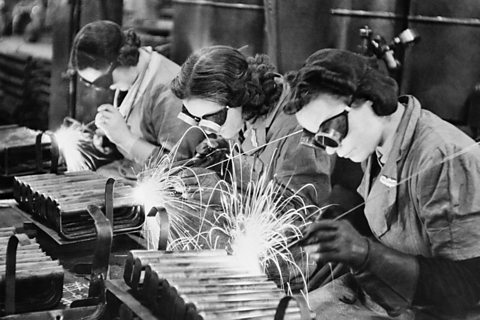Gender in An Inspector Calls

An Inspector Calls was written after World War Two. As many British men went away to fight during the war, their positions in work had to be filled by women. This helped change existing perceptions. Men had to acknowledge the fact that women were just as capable as them. As a result of this, many women enjoyed a newfound freedom that working and earning money allowed them.
Not all men saw this change in attitude as a good thing and stayed stuck in the past. Priestley explores the impact of these new gender roles through the independence of Eva Smith and the sexist attitudes of Mr Birling.
How is the theme of gender shown in the play?
In An Inspector Calls Priestley explores the theme of gender through:
- how Mr Birling and Gerald Croft view women
- how Mrs Birling treats Eva Smith
- how Eva Smith is portrayed as independent and outspoken before her death
| How does Priestley show this? | Evidence | Analysis | |
| How Mr Birling refers to women | When Mr Birling is telling Eric and Gerald about women's attitudes towards the clothes they wear. | "...not only something to make 'em look prettier - but - well, a sort of sign or token of their self-respect." | Mr Birling shows that he has a patronising view of women, making the suggestion that clothes are a sign of self-respect for them. He has a stereotypical view of women here and does not see them as individuals but suggests that all women think in the same way. |
| How Gerald refers to women | Gerald makes sexist and superficial comments about the women in the bar he visits. | "I hate those hard-eyed dough-faced women." | Gerald shows that he can be very superficial in his view of women. If they don’t meet his standard of how they 'should' look, he dislikes them. |
| How Mrs Birling treats Eva Smith | When Mrs Birling suggests that Eva is incapable of having feelings. | "She was claiming elaborate fine feelings and scruples that were simply absurd in a girl in her position." | Priestley shows that even women like Mrs Birling can be just as cruel and old fashioned as the men are. She does not try to empathise with a member of her own gender. This also highlights her negative attitude towards the working class |
| How Mr Birling refers to women | |
|---|---|
| How does Priestley show this? | When Mr Birling is telling Eric and Gerald about women's attitudes towards the clothes they wear. |
| Evidence | "...not only something to make 'em look prettier - but - well, a sort of sign or token of their self-respect." |
| Analysis | Mr Birling shows that he has a patronising view of women, making the suggestion that clothes are a sign of self-respect for them. He has a stereotypical view of women here and does not see them as individuals but suggests that all women think in the same way. |
| How Gerald refers to women | |
|---|---|
| How does Priestley show this? | Gerald makes sexist and superficial comments about the women in the bar he visits. |
| Evidence | "I hate those hard-eyed dough-faced women." |
| Analysis | Gerald shows that he can be very superficial in his view of women. If they don’t meet his standard of how they 'should' look, he dislikes them. |
| How Mrs Birling treats Eva Smith | |
|---|---|
| How does Priestley show this? | When Mrs Birling suggests that Eva is incapable of having feelings. |
| Evidence | "She was claiming elaborate fine feelings and scruples that were simply absurd in a girl in her position." |
| Analysis | Priestley shows that even women like Mrs Birling can be just as cruel and old fashioned as the men are. She does not try to empathise with a member of her own gender. This also highlights her negative attitude towards the working class |
Analysing the evidence
Question
How does Priestley explore ideas about gender in An Inspector Calls?
- Eva Smith is a modern woman - she is independent and fights for her own rights and those of others.
- Mr Birling is very patronising about women, claiming that they couldn’t organise a proper strike and makes sweeping statements about how they love clothes.
- Mrs Birling fulfils old-fashioned female roles. She thinks that women should support their husbands and not speak against them. She also turns against Eva Smith because she is going to be a single mother.
Priestley would have hoped that by the end of the play the audience have questioned their views of stereotypical gender roles.